Review (Guest): All EMF*d Up (*Electromagnetic Fields): My Journey Through Wireless Radiation Poisoning plus How You Can Protect Yourself
5 Star, Censorship & Denial of Access, Communications, Crime (Corporate), Crime (Government), Disease & Health, Environment (Problems), Power (Pathologies & Utilization), True Cost & Toxicity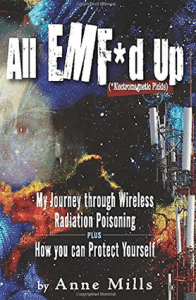
After suffering months of unexplained nausea, insomnia, ringing in the ears, fatigue and body aches she consulted with a German doctor to help her figure out what was happening. In her journey to find her own health she learned about the secrecy of government agencies and how evidence of health effects are suppressed. Her diary reads like Anne Frank. Chilling and a warning to us all. The last part of the book is devoted to valuable DYI measures to protect your home and family. In the age of wireless this book is a necessary read. Her story is reminiscent of other peoples journey’s into microwave illness and chronic electrohypersensitivity. All EMFd Up (Electromagnetic Fields): My Journey Through Wireless Radiation Poisoning and How You Can Protect Yourself. (2019) by Anne Mills is a good read.
Review: 935 Lies – The Future of Truth and the Decline of America’s Moral Integrity
5 Star, America (Founders, Current Situation), Censorship & Denial of Access, Communications, Crime (Corporate), Crime (Government), Culture, Research, Democracy, Future, Impeachment & Treason, Information Society, Intelligence (Public), Misinformation & Propaganda, Politics, Power (Pathologies & Utilization), Secrecy & Politics of Secrecy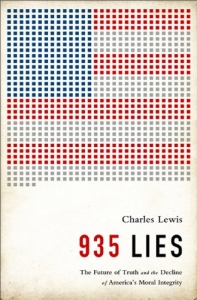
Charles Lewis
5.0 out of 5 stars Title Short-Changes Value — This is One of the Most Important Books of Our Time, July 12, 2014
I'm not thrilled with the title because it implies to the browser that the book is about the 935 now-documented lies that led to the war in Iraq, and that is not the case — those lies are simply one of many evidentiary cases spanned a much broader spectrum. As the author himself outlines early on, the book is about a retrospective review of the struggle for truth from the lies that led to Viet-Nam to date (less 9/11); a concurrent review of the corruption and diminuition of commercial journalism; and finally, the future of the truth.
Review: The Media Ecosystem — What Ecology Can Teach Us About Responsible Media Practice
5 Star, Capitalism (Good & Bad), Censorship & Denial of Access, Communications, Consciousness & Social IQ, Culture, Research, Economics, Information Operations, Information Society, Intelligence (Public), Media, Misinformation & Propaganda, Nature, Diet, Memetics, Design, Peace, Poverty, & Middle Class, Power (Pathologies & Utilization), Survival & Sustainment, True Cost & Toxicity, Values, Ethics, Sustainable Evolution, Voices Lost (Indigenous, Gender, Poor, Marginalized), Water, Energy, Oil, Scarcity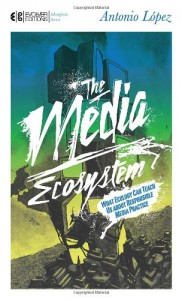
Antonio Lopez
5.0 out of 5 stars A unique and timely integrative overview with many original insights, August 22, 2013
I received this book as a gift, and am glad that I did as I normally would not have noticed it, bought it, or reviewed it. I hope my review will inspire others to buy the book, and if not, provide a summary of some of the highlights that I consider quite timely, original, and useful.
This is a manifesto of sorts, on CRITICAL INFORMATION, or stated another way, on public decision-support needs and the urgency of restoring both integrity (tell the truth) and holistic soundness (report on everything, and on the cause and effect cost and consequences of everything in relation to everything). Of course modern media fails this test, and the author should be credited with providing a manifesto and high-level handbook of how we might proceed.
Review: Le management de l’intelligence collective – Managing Collective Intelligence – Toward a New Corporate Governance
6 Star Top 10%, Change & Innovation, Communications, Complexity & Resilience, Consciousness & Social IQ, Culture, Research, Decision-Making & Decision-Support, Democracy, Intelligence (Collective & Quantum), Intelligence (Public), Intelligence (Wealth of Networks), Philosophy, Politics, Public Administration, Survival & Sustainment, Values, Ethics, Sustainable Evolution, Voices Lost (Indigenous, Gender, Poor, Marginalized)
Olivier Zara
5.0 out of 5 stars Sensational — Free Online in English Translation — For Sale Online in French, May 28, 2013
I just read this book in the free online English translation and have very high praise for the original content, the translation, and the graphics. It is a short book, 88 pages in English, with a self-testing appendix that will reveal that most organizations are leveraging, at best, 20% of their collective intelligence potential.
As the European Union, NATO, and the USA all re-examine their fundamental premises in the aftermath of failed elective wars in Afghanistan and Iraq, and all too many adventures, including a predatory attack on Libya to steal its gold, water, and oil, this book is the single best book I have found that could help the new generation of leaders in the EU, NATO, and the USA. The Cold War generals have failed for 50 years — we are long overdue for a new generation of leaders that understands the true cost of war and the fractional cost of waging peace to create a propserous world at peace.
In my own experience with Cold War flag officers, I find they understand three colors — red, yellow, and green. The new generation seems to be much more nuanced, much better read, and much more open to the reality that in war everyone loses except the bankers, and that Sun Tzu had it right centuries ago — the acme of skill is to defeat the enemy without fighting — better yet, utilize collective intelligence to achieve Non-Zero, a prosperous world at peace, a world that works for everyone.
Buy the book in French at AxioPole.com. Read the book free online in English.
Review (Guest): Surveillance or Security?: The Risks Posed by New Wiretapping Technologies
5 Star, America (Founders, Current Situation), Censorship & Denial of Access, Communications, Crime (Corporate), Crime (Government), Information Operations, Information Society, Information Technology, Intelligence (Government/Secret), Intelligence (Public), Justice (Failure, Reform), Power (Pathologies & Utilization), Public Administration, Secrecy & Politics of Secrecy, Security (Including Immigration), Values, Ethics, Sustainable Evolution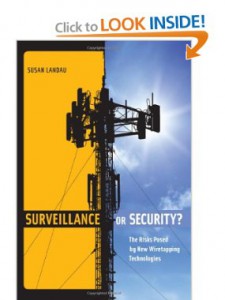
Susan Landau
5.0 out of 5 stars Definitive text on the topic July 8, 2011
Ben Rothke
Surveillance or Security?: The Risks Posed by New Wiretapping Technologies is a hard book to categorize. It is not about security, but it deals extensively with it. It is not a law book, but legal topics are pervasive throughout the book. It is not a telecommunications book, but extensively details telco issues. Ultimately, the book is a most important overview of security and privacy and the nature of surveillance in current times.
Surveillance or Security? is one of the most pragmatic books on the topic is that the author never once uses the term Big Brother. Far too many books on privacy and surveillance are filled with hysteria and hyperbole and the threat of an Orwellian society. This book sticks to the raw facts and details the current state, that of insecure and porous networks around a surveillance society.
In this densely packed work, Susan Landau, a fellow at the Radcliffe Institute for Advanced Study at Harvard University details the myriad layers around surveillance, national security, information security and privacy. Landau writes that her concern is not about legally authorized law enforcement and nationally security wiretapping; rather about the security risks of building surveillance into communications infrastructures.
Review: The Technology of Nonviolence
5 Star, Civil Society, Communications, Culture, Research, Democracy, Disaster Relief, Disease & Health, Education (General), Humanitarian Assistance, Information Society, Information Technology, Threats (Emerging & Perennial), Voices Lost (Indigenous, Gender, Poor, Marginalized)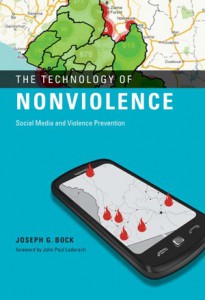
Joseph G. Bock
5.0 out of 5 stars Pioneering Work, Deserves a Great Deal of Attention, April 29, 2013
I am shocked that there are no reviews of this book. Brought to my attention by Berto Jongman, one of the top researchers in Europe with a special talent at the intersection of terrorism and related violence (e.g. genocide) and Open Source Intelligence (OSINT), he knew this is an area that is of very high interest to me.
The book passed my very first test, with more than ample references to Dr. Patrick Meier, a pioneer in crisis mapping, SMS translations and plotting by diasporas, and humanitarian ICT generally. I strongly recommend his blog and expect him to produce a book of his own soon.
The primary focus here is on social media via hand-held devices. It assumes a working Internet and does not have a great deal of focus on the urgency of achieving an Autonomous Internet, and more fully exploiting Liberation Technology and Open Source Everything (OSE), the latter my special interest along with M4IS2 (Multinational, Multiagency, Multidisciplinary, Multidomain Information-Sharing and Sense-Making).
Use Inside the Book to see the chapters and appendices. The author makes clear two major points early on:
01 Grassroots is where its at, not top down macro
02 Technology alone is not enough, organizing — the hard long road of grassroots organizing — is essential.


